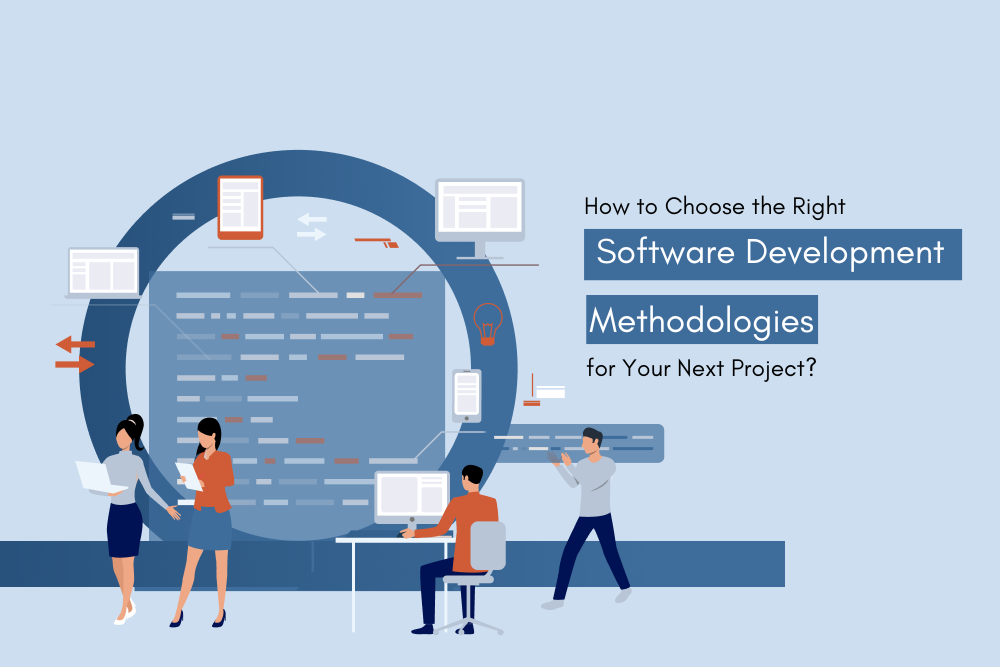How to Choose the Right Software Development Methodologies for Your Next Project?
Software development methodologies are vital for managing the challenges of software development, such as changing requirements and deadlines. Various methodologies, including Agile, Scrum and Spiral, are available, but selecting the right one is crucial as not all are suitable for every type of software. By choosing a suitable methodology and adhering to it, developers can ensure efficient work, effective communication and proper documentation, resulting in the timely delivery of high-quality software.

What are software development methodologies?
Software development methodologies consist of a series of processes and procedures implemented during the software development lifecycle, with the aim of benefiting both the development team and the clients.
An in-depth look at software development methodologies
To deliver high-quality products, custom software development companies leverage various methodologies such as Agile, Spiral, Scrum, Extreme Programming, Rational Unified Process and Big Bang.
Agile methodology
Agile methodology is an iterative approach to software development that prioritizes continuous planning, communication and collaboration between teams and clients. Other frameworks like Scaled Agile Framework (SAFe), Large-Scale Scrum (LeSS) and Scrum of Scrums (SoS) can customize Agile practices to meet the needs of a specific organization or project.
Phases
The software development process typically consists of several key phases:
- Concept Phase
- Inception Phase
- Iteration Phase
- Quality Assurance
- Software Release
Scrum methodology
The Scrum methodology follows an iterative development approach, where team members break down large tasks into smaller ones and work on them using sprints. This incremental approach accelerates development and adds value to complex projects. Moreover, the Scrum framework enables developers to incorporate conventional system development methodologies with flexible Agile practices.
Phases
The Scrum process involves several phases:
- Product Backlog
- Sprint Backlog
- Daily Scrum Meeting
- Product Increment
DevOps
DevOps, a term that gained popularity in the IT industry between 2007 and 2008, refers to a set of advanced tools, practices and process automation philosophies that combine IT operations with software development. By providing a framework for building, testing and releasing software rapidly. DevOps ensures improved outcomes and enables the continuous delivery of products.
Phases
The DevOps process involves several phases:
- Continuous Integration
- Continuous Testing
- Continuous Development
- Continuous Deployment
- Continuous Monitoring
Waterfall Model
Winston Royce introduced the Waterfall Model in 1970 through his research paper. This sequential and linear approach emphasizes the systematic progression of steps in the development process. In the Waterfall Model, each stage must be fully completed before the next phase can begin.
Phases
The software development process typically includes the following phases:
- Requirements analysis
- Design
- Implementation
- Unit testing
- Integration and system testing
- Operation and maintenance
Iterative
The iterative or incremental development model breaks the entire software development process into smaller segments, enabling teams to gradually improve the evolving versions until the entire system is ready. This model helps identify issues and make necessary improvements within a limited budget in the initial stages of the software development life cycle.
Phases
The Iterative process includes the following phases:
- Planning
- Analysis
- Implementation
- Evaluation
Spiral Model
A spiral model is a hybrid approach that blends iterative and waterfall models. It is risk-driven, with each phase beginning with a predetermined goal and ending with a client review. The development team adds new features in a continuous spiral, increasing in scope with each iteration until deployment.
Phases
The spiral model typically includes the following phases:
- Planning
- Risk Analysis
- Engineering
- Evaluation
V Model
The V Model is a commonly used software development methodology that incorporates testing at each stage of the project, allowing for the timely completion of the project. However, each step must be completed before moving to the next, ensuring that the project stays on track and on target.
Phases
The V Model includes the following phases:
- Unit Testing
- Integration Testing
- System Testing
- User Acceptance Testing
Big Bang
The Big Bang model is a simplistic approach to software development that is suitable for small projects but may lead to quality issues in larger projects due to the absence of in-depth planning and testing. Additionally, changes in requirements can cause significant delays, making it difficult to manage the project as a whole.
**Unlike other SDLC models, the Big Bang model doesn’t have specific phases.**
Feature-Driven Development (FDD) Model
Feature-driven development (FDD) is a software model created in 1997 by Jeff De Luca and Peter Coad for a Singaporean bank project. They built it in 15 months with 50 professionals. The FDD team comprises a project manager, chief programmer, chief architect, development manager, class owner and domain expert. In the first phase, an overall model of the system is created to provide a high-level view of the features to be developed.
Phases
The Feature-Driven Development (FDD) Model includes the following phases:
- Build a Feature List
- Plan by Feature
- Design by Feature
- Build by Feature
- Test by Feature
- Integrate Features
- Launch the System
Prototype Methodology
The prototype methodology involves creating an initial version of the software system that may have limited functionality, reliability and efficiency compared to the final product. However, it is a valuable tool as it allows the client to visualize and better understand the expected outcome of the final software product, which may not have been clear in the initial stages of the project.
Phases
The Prototype Methodology includes the following phases:
- Requirement collection and analysis
- Faster design
- Create a prototype
- Initial user evaluation
- Redefining prototype
- Implementation of product
- Timely maintenance
Rapid Application Development Methodology
The Rapid Application Development (RAD) methodology emphasizes quick customer feedback and rapid prototyping over prolonged development and testing cycles. This approach enables developers to make frequent iterations and updates to software efficiently, without starting from scratch each time. Moreover, RAD ensures that the outcome is high-quality and meets the end user’s requirements.
Phases
The Prototype Methodology includes the following phases:
- Goal Planning
- Prototype Design
- Rapid Development
- Production
Lean Development
The primary objective of the lean software development methodology is to minimize waste, improve efficiency and deliver the necessary features for the product. This approach involves releasing an initial software version developed by software engineers.
Principles
Here are some fundamental principles and practices often associated with lean development:
- Define value from the customer’s perspective.
- Map the value stream and identify waste.
- Create flow by eliminating waste and optimizing the value stream.
- Establish pull by letting customer demand drive development.
- Pursue perfection by continuously improving the process.
Summary
Choosing the right software development methodology for your project is crucial and depends on various factors such as project scope, budget, resources, and time frame. It’s essential to analyze the pros and cons of each methodology and consider the necessary tools and expertise required. Our experts can assist you in selecting the best methodology for your enterprise.
Our Services
Products
Contact Us
USA: +1 (971) 420-1700
Canada: +1 (971) 420-1700
India: +91 63807-80156
Email: contact@centizen.com
Centizen
A Leading IT Staffing, Custom Software and SaaS Product Development company founded in 2003. We offer a wide range of scalable, innovative IT Staffing and Software Development Solutions.
Contact Us
USA: +1 (971) 420-1700
Canada: +1 (971) 420-1700
India: +91 63807-80156
Email: contact@centizen.com






